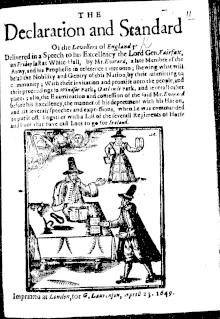
William Everard (bap. 1602, d. in or after 1651) was an early leader of the Diggers. [1] [lower-alpha 1]

William Everard (bap. 1602, d. in or after 1651) was an early leader of the Diggers. [1] [lower-alpha 1]
William Everard was apprenticed on 14 August 1616 to Robert Miller of the Merchant Taylors' Company, London. He was the son of William Everad, a yeoman of Reading and had been baptized on 9 May 1602 in the parish of St Giles, Reading, as William Evered. [2] This Everad took the Protestation Oath in the parish of St Lawrence, Reading on 20 February 1642. Less than a year later a William Everard was serving as a Parliamentary scout for Sir Samuel Luke in the Berkshire and Oxfordshire area. Hessayon speculates that he may have been captured by the Royalists as there is no record of him until May 1647 when an ensign by the name of William Everard signed a petition voicing the grievances of the army under the command of Sir Thomas Fairfax. [1] [3] He was cashiered out of the army in late 1647 or early 1648 for plotting to kill Charles I.
In 1648 he was briefly imprisoned in Kingston, Surrey, for causing a disturbance, and Gerrard Winstanley wrote Truth Lifting up its Head above Scandals in his defence. [4] In March 1649 he appeared before a Justice of the Peace for causing a disturbance in Staines Church. [5]
Early the next month (April 1649) Everard went to St George's Hill, Weybridge, Surrey with four others and joined the Diggers commune. By the end of the week they had been joined by about thirty others. [6] The group called themselves True Levellers, before the month was out complaints had been made to the Council of State over their behaviour. A troop of cavalry was sent to disperse the group and escorted Everard and Winstanley the acknowledged leaders to London to see General Fairfax. They appeared before him on 20 April and famously refused to remove their hats in his presence (an act that, at that time, was seen as showing a lack of respect for his authority). They justified their commune's actions to him using the same arguments as they presented in the Diggers first manifesto, The True Levellers Standard Advanced, [7] which was published around the same date. [8] Everard's name appeared as one of the subscribers on the first manifesto, but that was his last involvement with the group. [1]
In May, contemporary newspapers and pamphlets reported that William Everard was mixed up in the Levellers inspired Burford Mutiny, but this seems to have been a case of mistaken identity with the army agitator, Captain Robert Everard. [1]
In August 1649 Everard was reported to be in the parish of Bradfield, Berkshire the rector of which was John Pordage. Pordage had been curate and vicar of St Lawrence, Reading so they may have been old acquaintances. At the end of the next summer Everard returned to the parish as a harvest worker. There was serious disruption in the village, with people running around in trances and acting in strange ways. The local population accused Everard of being a conjurer or witch (and so presumably considered to be ultimately responsible). [9]
Later the same month Everard was in London where he was seen to be in a "frantick posture". [10] Shortly afterwards (in October 1650) he was detained and imprisoned in Bridewell on the instructions of the Council of State as they thought his rantings to be affected (see Ranters). He was not the only one so detained and the end of December it was reported "many of Ranting Everard's party are lunatick, and exceedingly distracted; they talk very high against the Parliament, and this present Government; for which some of them have received the lash". [11] During the next few months Everard's behaviour deteriorated and, as his wife had previously requested, in March 1651 he was moved to Bethlem Hospital for his and others protection. [12] What happened to him after that is unknown. [1]
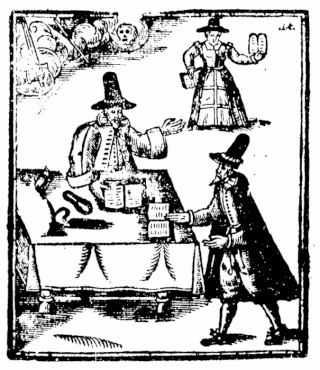
The Levellers were a political movement active during the Wars of the Three Kingdoms who were committed to popular sovereignty, extended suffrage, equality before the law and religious tolerance. The hallmark of Leveller thought was its populism, as shown by its emphasis on equal natural rights, and their practice of reaching the public through pamphlets, petitions and vocal appeals to the crowd.

John Lilburne, also known as Freeborn John, was an English political Leveller before, during and after the English Civil Wars 1642–1650. He coined the term "freeborn rights", defining them as rights with which every human being is born, as opposed to rights bestowed by government or human law. In his early life he was a Puritan, though towards the end of his life he became a Quaker. His works have been cited in opinions by the United States Supreme Court.
The Ranters were one of a number of dissenting groups that emerged around the time of the Commonwealth of England (1649–1660). They were largely common people, and the movement was widespread throughout England, though they were not organised and had no leader.

The Diggers were a group of religious and political dissidents in England, associated with agrarian socialism. Gerrard Winstanley and William Everard, amongst many others, were known as True Levellers in 1649, in reference to their split from the Levellers, and later became known as Diggers because of their attempts to farm on common land.
Gerrard Winstanley was an English Protestant religious reformer, political philosopher, and activist during the period of the Commonwealth of England. Winstanley was the leader and one of the founders of the English group known as the True Levellers or Diggers. The group occupied formerly common land that had been privatised by enclosures and dug them over, pulling down hedges and filling in ditches, to plant crops. True Levellers was the name they used to describe themselves, whereas the term Diggers was coined by contemporaries.
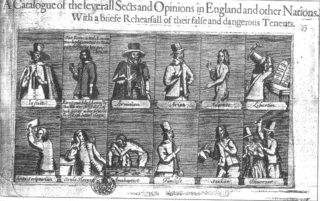
English Dissenters or English Separatists were Protestant Christians who separated from the Church of England in the 17th and 18th centuries.
The Interregnum was the period between the execution of Charles I on 30 January 1649 and the arrival of his son Charles II in London on 29 May 1660 which marked the start of the Restoration. During the Interregnum, England was under various forms of republican government.

John Pordage (1607–1681) was a Church of England priest, astrologer, alchemist and Christian mystic. He founded the 17th-century English Behmenist group, which would later become known as the Philadelphian Society when it was led by his disciple and successor, Jane Lead.
Laurence Clarkson (1615–1667), sometimes called Claxton, born in Preston, Lancashire, was an English theologian and accused heretic. He was the most outspoken and notorious of the loose collection of radical Protestants known as the Ranters.

Winstanley is a 1975 British black-and-white film about social reformer and writer Gerrard Winstanley. It was made by Kevin Brownlow and Andrew Mollo and based on the 1961 David Caute novel Comrade Jacob.
"The Diggers' Song" is a 17th-century English ballad by Gerrard Winstanley, a protest song about land rights inspired by the Diggers movement. The lyrics were published in 1894 by the Camden Society. It is sung to a version of the family of tunes later used for "Sam Hall", "Captain Kidd", and "Admiral John Benbow", which according to Roy Palmer was first printed in 1714. The English band Chumbawamba recorded a version of this song on their 1988 album English Rebel Songs 1381–1914.
Major William Rainsborowe, or Rainborowe, was an officer in the English Navy and New Model Army in England during the English Civil War and the Interregnum. He was a political and religious radical who prospered during the years of the Parliamentary ascendancy and was an early settler of New England in North America.
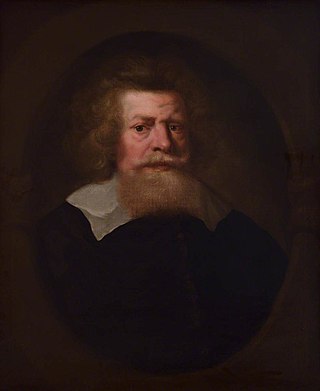
William Dell was an English clergyman, Master of Gonville and Caius College, Cambridge from 1649 to 1660, and prominent radical Parliamentarian.
Richard Coppin was a seventeenth-century English political and religious writer, and prolific radical pamphleteer and preacher.
Theaurau John Tany was an English preacher and religious visionary.
David W. Petegorsky was author of an acclaimed book on Gerrard Winstanley and the Diggers.
Robert Everard was an English soldier who fought for the Parliamentary cause during the English Civil War and was a religious controversialist in the 1650s. He promoted Baptist views, Socinianism and Arianism; and in later years declared himself a Roman Catholic convert.
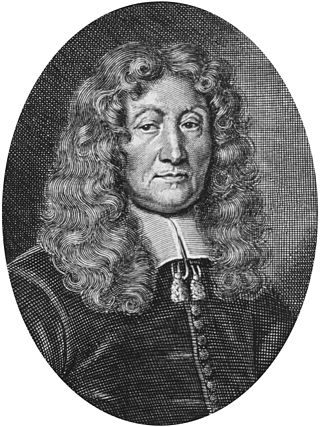
William Walwyn was an English pamphleteer, a Leveller and a medical practitioner.
The Law of Freedom in a Platform, or True Magistracy Restored is a six-chapter book published in 1652 by Gerrard Winstanley, a participant in the Diggers movement. In the book he argued that, under a Christian basis for society, private property should be abolished. In keeping with Winstanley's adherence to biblical models, the tract envisages a communist society, establishing the beginnings of modern Christian socialism.
William Eyre, was an English Parliamentary army officer in the English Civil War and a Leveller.